Is this Russian rabbi fair game for sanctions, or being held to a double standard?
A Chabad rabbi singled out for sanctions says he doesn’t support the war in Ukraine. His critics say he hasn’t done enough to oppose it
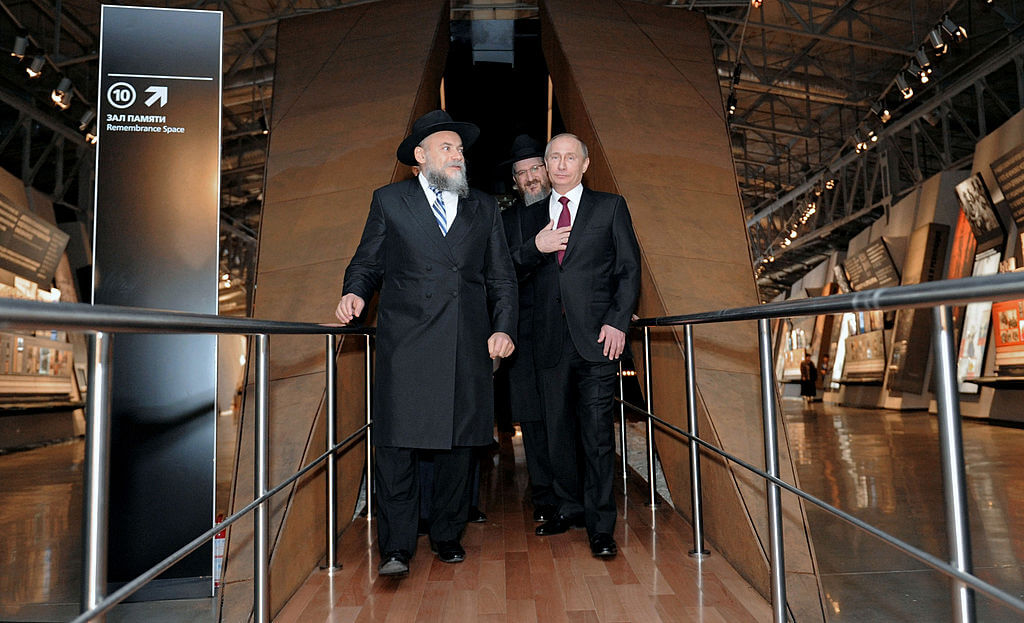
Russia’s President Vladimir Putin, right, with Rabbi Alexander Boroda, left, and Rabbi Berel Lazar, center, in a visit to the Jewish Museum and Tolerance Center in Moscow in 2013. Photo by Alexey Druzhinin/AFP via Getty Images
Rabbi Alexander Boroda, regarded as Russia’s second-most influential Jewish leader, feels misunderstood — and worried for the nation’s Jews.
Boroda said the comments that prompted a leading pro-Ukraine group to add him to its list of people recommended for international sanctions were taken out of context, and that his inclusion puts Russia’s already vulnerable Jews at further risk.
“It’s not just me; it’s the whole organization,” Boroda said last week in an interview, referring to his Federation of Jewish Communities of Russia, which serves more than 150,000 people in 180 communities.
“Research all my official or not-official comments, interviews or everything,” he added. “You will not find anything about support of this war situation.”
But since Rabbi Boroda was added on July 29 to a list of dozens of “sellout opinion leaders” by the Anti-Corruption Foundation, a group created by Russian dissident Alexei Navalny, two similar groups have put him in their sights as well.
A member of the National Agency on Corruption Prevention, a Ukrainian group compiling its own list of Vladimir Putin collaborators and supporters of the war in Ukraine, said that it was looking into Boroda’s case and would reach a determination in the next week on whether to add him.
And Jacob Nell, a member of the Yermak-McFaul Expert Group on Russian Sanctions, said: “Having read his statements, I don’t think Boroda has any defense.”
About 7,000 individuals are, collectively, on the running lists compiled by these three groups, 1,000 of whom — including the Russian Jewish oligarch Roman Abramovich and Lev Leviev — have had sanctions actually leveled against them by governments including the United States and the European Union. Those sanctions generally ban the individuals from international travel and freeze their assets.
Looming over the dispute is the specter of an autocrat notorious for retaliating against dissenters — and centuries of Jewish persecution in Eastern Europe. Boroda may be attempting to tread lightly in his public remarks, hoping to avoid the ire of Putin and the largely pro-war Russian public. A spokesperson for the Chabad movement, with which Boroda is affiliated, said adding the rabbi to the list was “morally repugnant.”
Russian Jews have been in a precarious situation since the war began. The Kremlin recently moved to shut down the Jewish Agency, which supports emigration to Israel. Rabbi Pinchas Goldschmidt, who was Moscow’s chief rabbi until the war began, is one of the thousands who have fled to Israel, leaving a position he held for 30 years. He told NPR last week that while before the war Russian Jewish leaders could keep a low profile, now the Kremlin “is going to demand much more from everyone who is still in an official leadership position.”
News reports have described Boroda as a Putin confidant, though the rabbi told the Forward he had not seen the Russian president since the beginning of the pandemic and that the two “only speak about Judaism in Russia.” He is also connected to Abramovich, who has historically been a major funder of Jewish causes in the country.
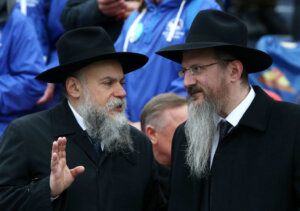
What he said
The comments that landed Boroda on the Anti-Corruption Foundation’s list were made March 4 in an interview with the Russian media outlet Interfax, in which he described a “surge of neo-Nazism in Ukraine,” seemingly propagating a claim Putin used as pretext for his Feb. 24 invasion.
“He supported the main narrative of Russian propaganda that the aggression against Ukraine has a legitimate goal — the ‘denazification’ of Ukraine,” a spokesperson for the group said. “After that, no statements were made that would disavow pro-war statements.”
Speaking via Zoom from his home in Moscow, Boroda said that his comments were similar to statements made by non-Russian Jewish leaders over many years. He said Interfax framed the comments in a misleading way, and that, at his behest, the news agency removed that question, as well as the preface about denazification, from its website some weeks later.
Interfax, an outlet that refers to the war in Ukraine as a “special military operation,” prefaced its article containing Boroda’s comments with the assertion that one of the goals of the war was the denazification of Ukraine — a pretext that has been widely debunked outside of Russia.
“The Jewish community of Russia has repeatedly condemned the episodes of neo-Nazism in Ukraine,” the Interfax reporter said to Boroda. “How do you characterize the nationalist movement of recent years?”
Boroda responded by describing “the surge of neo-Nazism in Ukraine” at length and Ukraine’s failure to rein it in. He referred to a far-right Ukrainian party with neo-Nazi origins and to the monuments to Nazi collaborators that pock Ukrainian cities, before concluding: “With a great deal of confidence, I believe that the majority of Ukrainian citizens do not support the ideology that has grown out of the criminal episodes of history.”
These comments drew swift backlash from his Jewish counterparts in Ukraine.
Rabbi Moshe Reuven Azman, one of the country’s most prominent rabbis, told the Jerusalem Post that Boroda “has a choice: either to be on the side of the light — which is Ukraine — or with the darkness: Russia.”
Representatives from both the Anti-Corruption Federation and the National Agency said the timing of Boroda’s remarks and the fact that they were made to Interfax meant that the rabbi was tacitly throwing his weight behind a false Kremlin narrative justifying the war.
“Antisemitism and neo-Nazism is at least as much of a problem in Russia,” said Nell, of the McFaul group. “So talking about it as if it is a problem in Ukraine and not in Russia is misleading — and deliberately and intentionally misleading for somebody speaking in Boroda’s position.”
Speaking to the Forward, Boroda said he never connected the question about neo-Nazi activity in Ukraine to the war. He noted that former Israeli President Reuven Rivlin had made similar comments in a 2016 address to the Ukrainian Parliament. And he clarified that he does not think Nazis are in power in Ukraine, but that a “small quantity” of people with fringe views who glorify historical Nazi collaborators has been growing gradually there in the last decade.
“I answered exactly what they asked me,” he said. “They asked me what’s my stance with the situation. I cannot say, ‘It’s OK.’ But it’s not a reason to enact war. It’s not connected.”
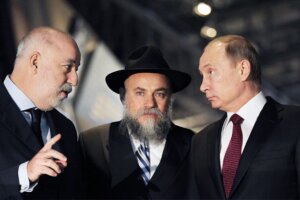
The National Agency researcher, however, said there were other parts of the interview that also made them suspicious about Boroda’s loyalties. For example, in discussing a Russian missile that landed at Babyn Yar, the site where Nazis executed tens of thousands of Jews in 1942, Boroda did not question the Interfax interviewer’s false assertion that the attack, “as it turned out, did not take place.”
As with the presence of neo-Nazism in Ukraine, the March 1 incident at Babyn Yar does not fit neatly into either side’s narrative. Five people were killed in the missile attack, but it appeared to target a nearby telecommunications tower, not the memorial. Contrary to initial reports, most of the memorial, which is under construction, emerged unscathed.
Boroda was cryptic about it in the Interfax interview published the next day. “You can not succumb to information hysteria,” he said.
“At the moment, media representatives from different countries confirm that the memorial is not damaged,” he added. “But, unfortunately, even the reports of publications with international authority can be unreliable.”
Nell also raised questions about a statement Boroda sent to the Jewish community the day after the Russian invasion. While it mentioned “respect for neighbors and their rights,” Boroda also referenced “the Ukrainian and Russian peoples’ shared history,” and said that Jews in the Soviet Union “never knew what separation and borders were,” both echoes of Putin’s position that Ukraine is really just part of Russia.
The ‘w’ word
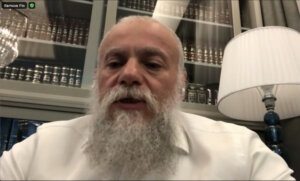
Speaking with the Forward Aug. 8, Boroda said that he has never supported the war, even tacitly. He also avoided directly condemning it — or even using the word “war” to directly describe the action, which Russia has made a crime punishable by 15 years in prison.
Throughout the 30-minute conversation, Boroda favored the term used by the Kremlin for the invasion of Ukraine — a “military operation” — instead, though he once referred to “this war situation.”
Speaking more broadly, though, he used the word freely and forcefully.
“There’s never a reason to do war, because all problems could be solved and must be solved at the table, not by war and not by weapon,” said Boroda, whose deputy was also present during the interview.
The rabbi said he had not been in contact with Putin since the war began, and chuckled when asked if he thought telling the Russian president to end it would have any effect.
Boroda described the sanctions against Abramovich as a “huge problem” for the federation and questioned whether sanctions had produced the pressure on Putin foreign governments had sought. Boroda had previously attributed 80% of the growth of Russian Jewish communities to Abramovich alone.
He said the sanctions on Jewish oligarchs were threatening the federation’s ability to keep community schools and synagogues open, and said that the orphans and elderly his organization feeds may suffer for it.
“Some way I think we will have to close something,” Boroda said.
And he downplayed the pressure against him that others have suggested, pointing out that Goldschmidt, the rabbi who fled Russia, told NPR that the government had not asked him directly to support the war.
“Nobody pushed me to say something to support war,” he said. “And I don’t know who was pushed to support it among the religious people. I don’t know. For me, for sure not.”
There are ways Russian religious leaders could stand to gain from toeing the line effectively. Lazar, the chief rabbi, said “We must pray for peace,” yet was visible in box seats at Russia’s Victory Day military parade this year.
According to Nell, who is also a senior research fellow at the Kyiv School of Economics, leaders who show fealty to Putin have access to a “0.1% lifestyle” — and their organizations may also benefit through the protections and perks that come with official state recognition.
When Goldschmidt was asked about Russian religious leaders who haven’t opposed the war as vehemently as he has, told the newspaper Israel Hayom that he doesn’t judge leaders who don’t come out against the war. “The situation there is very difficult,” he said. “When you live in a country that isn’t free, like Iran, you don’t say everything that’s on your mind.”
‘Clever words’
Dietrich Brauer, who resigned as Archbishop of the Evangelical-Lutheran Church of Russia after leaving the country in March, said that the Kremlin issued a “clear demand” of all religious leaders to support the war, and most did.
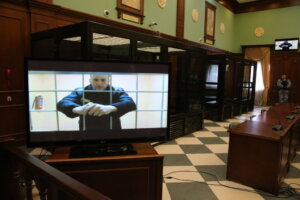
“The Jewish chief rabbi who also has American citizenship found clever words,” Brauer said, referring to Berel Lazar, Russia’s chief rabbi who is considered the country’s most influential Jewish leader. “He called on everyone to work for peace. We could have joined that. I wanted to write a joint statement with all religious communities, but the others didn’t agree. Together we could have made a difference.”
In an interview with the Jewish Telegraphic Agency a few weeks after the Interfax article was published, Boroda said, “It’s a complicated situation.”
“During times of war, people are not thinking rationally. Some think: You’re either with us or against us,” he said then. “We explain that bringing peace is the basis for any religious community, especially the Jewish one. But I can’t say everyone understands. Some people from other faiths — they expect us to support the military action.”
A representative from Navalny’s Anti-Corruption Federation said that Boroda was an open-and-shut case.
“We believe that the statement was completely unambiguous and this is confirmed by the reaction of the Jewish community in Ukraine, outside observers in Israel, the assessment of these statements in Russia and our assessment of these words,” the representative wrote in an email. “We do not believe that the reproduction of the propaganda narrative leaves room for interpretation. On the contrary, attempts to disavow the statement do not contain any assessment of Russia’s aggression against Ukraine and are aimed not at clarifying the position, but at blurring it.”
Rabbi Motti Seligson, a Chabad spokesperson in New York, said Boroda is focused on ensuring the wellbeing of the Russian Jews with whom he works. “It is morally repugnant to suggest that Jewish communal leaders and rabbis in Russia who refuse to sacrifice their communities for the sake of some sort of pronouncement be punished,” he said.
But Nell said good conscience would require Boroda taking a stand against Russia’s aggression.
“Maybe he will find the moral courage to condemn the war now, before he gets sanctioned and cut off from the west,” he said in a text message.






















